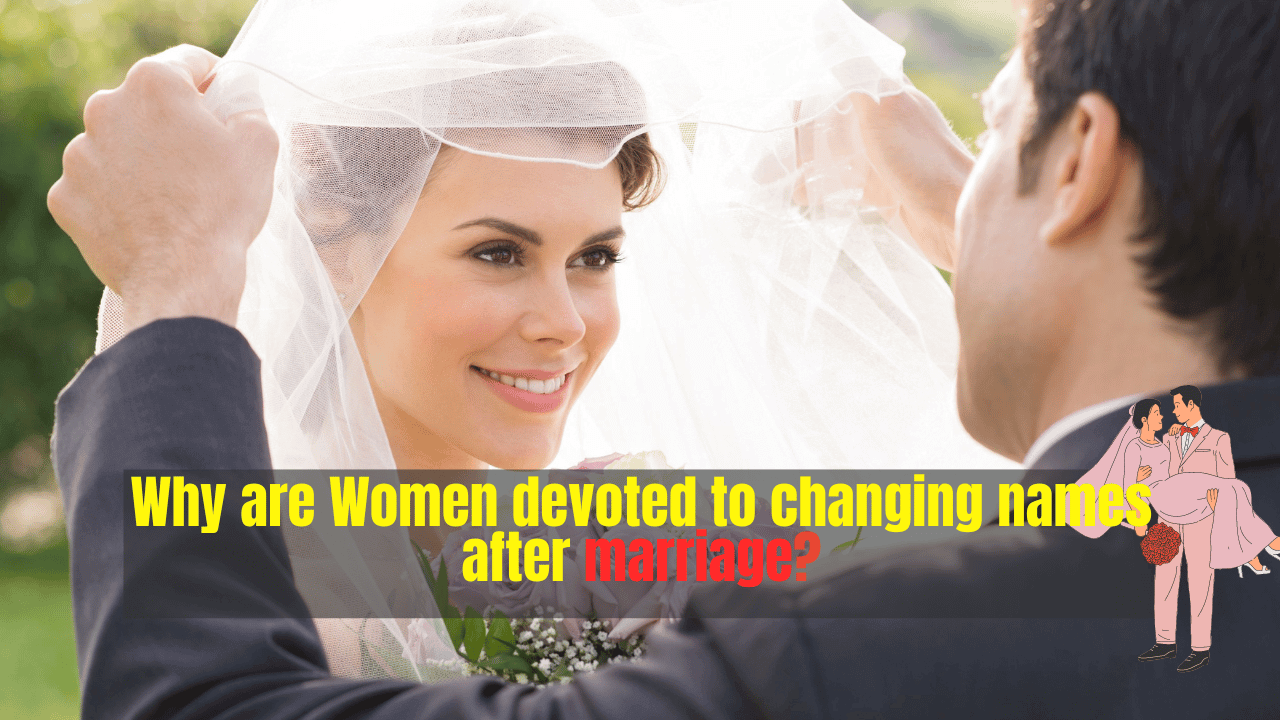Top 10 AI Marketing Apps & Benefits – Power of Artificial Intelligence
2 years agoWhy are Women devoted to changing names after marriage?
3 years ago -

We are the women of the 21st century, why are women devoted to changing their name after being married.
Recent statistics show that an increasing number of women are choosing to use their birth names in addition to their husband’s surnames after marriage. According to information provided by The Deed Poll Office, a law firm that specializes in name changes, the number of requests from newlyweds to maintain their maiden names alongside their spouse’s surname (rather than alter it totally) increased by 30% between 2020 and 2022.
Women seem to be catching up at last, and in my opinion, it couldn’t have happened fast enough. Since it is the year 2022, no woman should compromise her own identity in favor of her husband. We are not Chattel.
And I can speak from experience since, like many of my friends and peers, I underwent the heteronormative rituals of marriage. I was expected to change overnight after getting married in 2018. However, due to a stubborn habit, I didn’t change my last name or give it the status of my middle name. My parents, sister, and brother continue to torment me by saying that I am no longer part of the Saud family. We were raised in a society in this manner, correct?
To be honest, neither does it deepen your love nor make any sense to change your last name after marriage. Lolz
Why do women give up their identities so readily when they are so important to us? I don’t have any easy or general solutions. As with so many others, I think I was completely seduced by the idea of “tradition” and carried away by the Disney-patronized vision of love and “being one” that is instilled in young girls practically from birth.
We hear songs about it, read books about it; see it echoed in fairytales like Sleeping Beauty, Cinderella, Beauty and the Beast. We are encouraged to give up our distinct identities for the benefit of the family and to strive to be swept off our feet by a Prince Charming. Giving yourself to a guy, to a husband, is taught to young girls as “romance,” but in reality, there is nothing romantic about it.
In actuality, finding a “soulmate” or being in love was never meant to be the focus of marriage. Marriage originally had a possession-based meaning. Marriage was created to provide women with financial stability and to transfer parental duty from the father to the husband.
I believe that every woman has the freedom to make her own decisions regarding marriage, but that no woman should ever adopt her husband’s name. This archaic custom must disappear since it merely serves to propagate harmful gender stereotypes.
Just see what occurs to our children when we assign them rigid societal roles: While girls were growing in confidence and eager to explore a wide range of activities, boys were not doing the same. In fact, 71% of boys were afraid they would be teased if they played with what they described as “girls’ toys,” according to Lego’s alarming analysis of nearly 7,000 parents and children aged 6 to 14 in the UK, US, China, Japan, Poland, the Czech Republic, and Russia.
In addition, research by the Fawcett Society in 2019 demonstrated how gender stereotypes in early childhood have a lasting influence, with particular implications for both job decisions and interpersonal interactions. According to a study, girls were three times more likely to be encouraged to try baking than boys, and they were five times more likely to be encouraged to try dancing or dressing up when playing, whereas boys were more likely to be encouraged to do sports or Stem (science, technology, engineering, and mathematics) activities.
When a woman changes her surname to her husband’s, she perpetuates the myth that she “belongs” to him and ignores hard-fought battles to gain the right to keep her name.
We must consider what we are teaching our children now more than ever. Since misogyny has its roots in marriage, it damages both men and women.
You don’t trust me? Just take a peek at its past. When a woman in Nepal got married, she lost her right to an identity but gained home and, in some situations, some wealth (as a daijo). “Until death does us part,” their husbands took on the role of their legal guardians. That legacy is what caused women to stop using their names, so why do we still insist on upholding it in our ostensibly progressive and enlightened society today?
When I ask my friends why they want to change their names, they typically respond that they want to have the same last name as their children or that they want to appear as a “family unit” or “united front.” I understand that, but it still gives me the creeps because it’s just another way that women are supposed to give up their individuality in order to become one with their spouse, much like moms were required to give up their right to be listed on their children’s marriage licenses (until a change thankfully occurred in 2021).
Of course, some people choose to preserve their name, and others come up with a welcome new arrangement, like the Twitter pair who “swapped” surnames or the couple I know who took each other’s names and hyphenated them both. In other countries, like the Netherlands, you are prompted to choose a name. In Sweden, women typically maintain their natural family name. The most well-known example of breaking with tradition is perhaps Dawn O’Porter, who added the “O” when she wed Chris O’Dowd.
I applaud individuals who are attempting to break with tradition, like Lewis Hamilton, a seven-time world champion, who announced in March that he was changing his name to Larbalestier in honor of his mother. Because he “doesn’t really really comprehend the whole idea of why, when individuals get married, the woman loses her name,” he claimed to have made the choice in part. If only British people were that progressive.
Is it OK to keep your last name after marriage?
Whether a woman keeps her surname or uses her partner’s after marriage is a matter of personal preference, and today, there are no legal issues with doing either.
Should a woman change her name after marriage?
However, there’s no law that makes this compulsory. Women choose to adopt their husband’s surnames for various reasons after marriage. Some married women change their last name because they considered it as an emblem of marital status as well as the ‘perceived prestige that comes with marriage.
How many women choose to take their husband’s surname?
Through a series of Google Consumer Surveys, the New York Times reported that over 70 percent of women in the U.S. opted to take their husband’s family name after marriage.
If I haven’t persuaded you yet, consider Shakespeare’s famous query, “What’s in a name?” from Romeo and Juliet, one of the most swoon-worthy plays ever written.
- What are the top highest rating most watched K-Dramas on Netflix right now?
- How to Optimize for Zero-Click Searches? Is It Bad for SEO?
- Metaverse Marketing: Social Media Marketing in the Metaverse
- What is On Page Optimization? Keyword, URL, Meta Tags, ALT Tags & MORE!



![[2025 Updated] Top 10 Digital Marketing Agencies in Nepal Ranked!](https://mysticrubs.com/wp-content/uploads/2022/05/top-10-digital-marketing-company-in-nepal.png)








